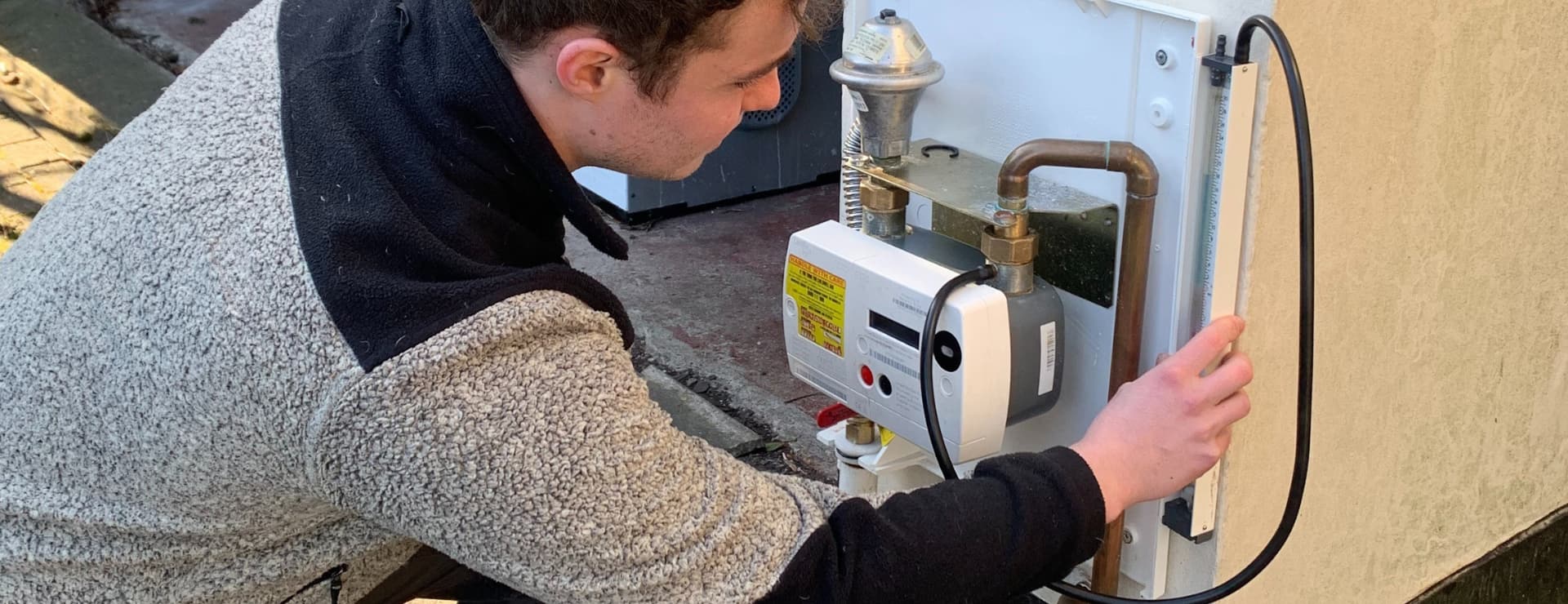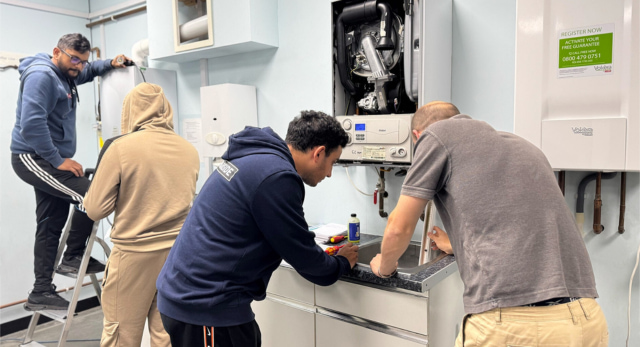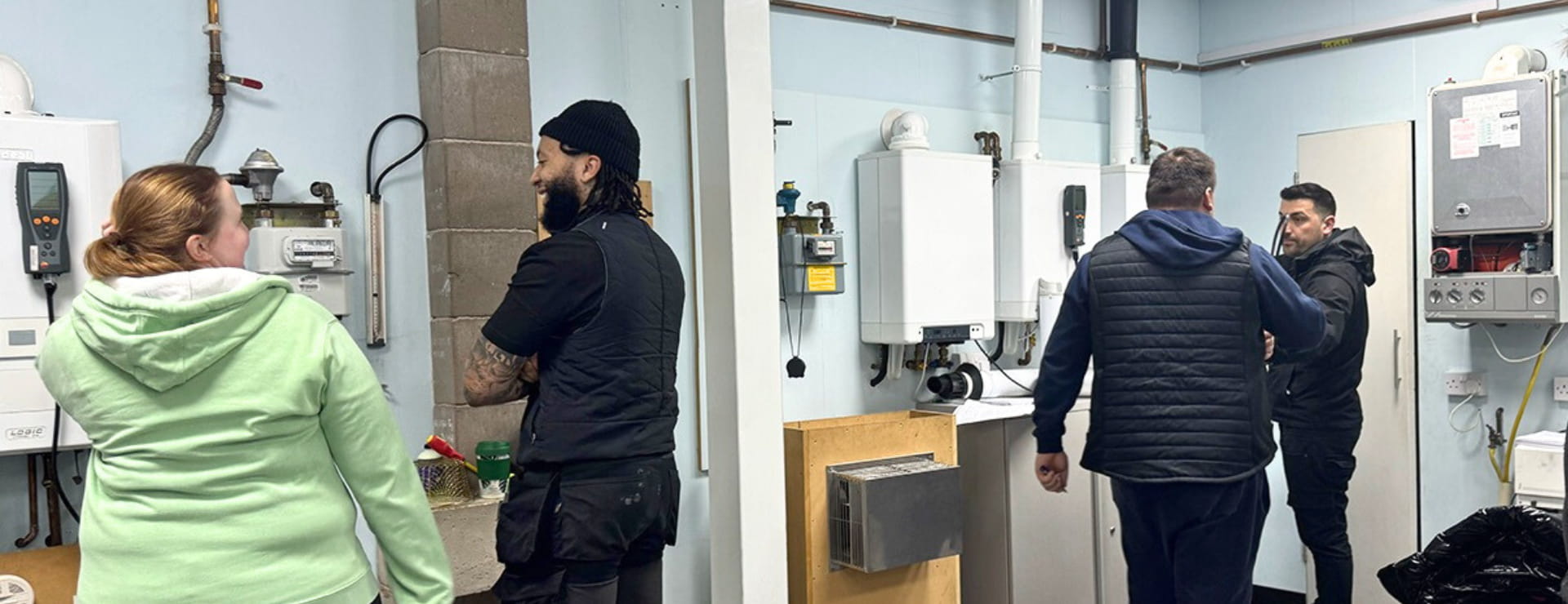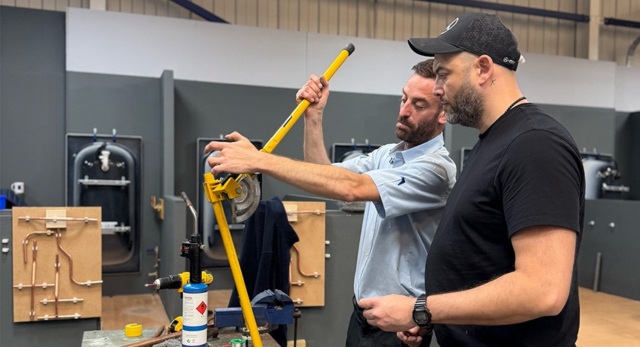The time it takes to become a gas engineer depends on your chosen training route. Apprenticeships take 18 months to 2 years, while training courses can be completed in as little as 8 weeks, plus portfolio building. College courses last 1 to 2 years, and Managed Learning Programmes vary based on experience. All routes require ACS gas training, a portfolio of on-site work, and Gas Safe registration to legally work.
The Main Routes to Becoming a Gas Engineer
1. New Entrant Gas Training Course
If you’re starting from scratch with no plumbing, heating, or related trade experience, this is your path. The New Entrant Gas Training Course is specifically designed for those looking to enter the industry without any previous technical background. It offers a structured blend of theoretical learning and practical, hands-on experience, making it accessible and effective for complete beginners.
What’s involved?
- Classroom and Workshop Training: Learn the theory and get hands-on with real equipment. The training is generally split into 2 parts:
- Domestic Gas Heating Installer Training – 4 weeks of learning the basic principles of plumbing and heating.
- Gas Managed Learning Programme – 4 weeks of intensive training that is focused purely on domestic gas safety.
- Portfolio Building: Gain on-the-job experience under supervision, logging your work as evidence of competency. The time it takes to complete this element is highly dependent on the learner’s ability.
- ACS Assessment: Pass the Accredited Certification Scheme (ACS) exams, including the all-important CCN1 (Core Gas Safety) and appliance modules.
- Gas Safe Registration: Once you pass, you can register with Gas Safe and start working legally as a gas engineer.
How long does it take?
- Typically 8–12 months (can be faster for the super-committed, or longer if you’re fitting training around work/family).
- The speed depends on your availability, how quickly you complete your portfolio, and when you book your ACS assessment.
| Pros | Cons |
|---|---|
| Open to complete beginners. No prior experience needed | Some providers offer online training that brings risks |
| Comprehensive foundation in gas engineering | It can be difficult learning again after a career change |
| Structured learning with clear progression | Portfolio building can be challenging to arrange |
| Weekday or Weekend availability |
2. Experienced Trades Training Course (Gas Managed Learning Programme)
Already a plumber, heating engineer, or kitchen fitter? The Gas Managed Learning Programme is tailored for individuals who already possess relevant skills and experience in a related trade. By building on your existing knowledge, this route offers a faster, more focused pathway to becoming a qualified gas engineer, allowing you to upskill efficiently and effectively.
What’s involved?
- Classroom and Workshop Training: Build on your existing skills with targeted gas safety modules. This element of the course is 4 weeks long and focused purely on domestic gas safety.
- Portfolio Building: The portfolio element is needed to build evidence of competency of working with gas. The time it takes to complete this element is highly dependent on the learner’s ability.
- ACS Assessment: Pass the Accredited Certification Scheme (ACS) exams, including the all-important CCN1 (Core Gas Safety) and appliance modules.
- Gas Safe Registration: Once you pass, you can register with Gas Safe and start working legally as a gas engineer.
How long does it take?
As little as 7 months for experienced tradespeople, depending on how quickly you complete your portfolio and assessments.
| Pros | Cons |
|---|---|
| Utilises existing skills | Requires a pre-course assessment |
| Quicker pathway | May need additional training |
| Weekday or Weekend availability | Portfolio building can be challenging to arrange |
3. Apprenticeships
Prefer to learn on the job and get paid? Apprenticeships are a fantastic option, especially for school leavers or those wanting to combine study with real-world experience.
What’s involved?
- Level 3 Gas Engineering Installer Apprenticeship: Combines classroom study with hands-on work for an employer.
- Mentorship and Support: Learn from experienced engineers and trainers while working in a live environment.
- Industry-Recognised Qualifications: Apprenticeships will include City & Guilds, LCL Awards, or other awarding bodies’ qualifications, as well as the ACS assessments.
How long does it take?
18-24 months is typical for the Level 3 Gas Engineering Installer Apprenticeship.
| Pros | Cons |
|---|---|
| Earn while you learn | Longer duration compared to intensive courses |
| Gain practical experience alongside theory | Competitive entry requirements |
| Direct mentorship from seasoned professionals | Starting salary may be off-putting |
4. College Courses
College-based gas engineering courses offer another route, especially for those who prefer a more academic setting or want a structured, classroom-focused approach. These courses are often available through further education colleges across the UK and can be a good fit for both school leavers and adults looking to retrain.
What’s involved?
- Level 2 or Level 3 Diplomas in Gas Engineering: These courses combine classroom-based learning with practical skills sessions in college workshops.
- Work Placement: Most college courses require a period of work experience or placement with a Gas Safe registered employer to gain hands-on skills and build a portfolio.
- Assessment: You’ll need to complete coursework, practical assessments, and pass the relevant ACS gas exams.
- Gas Safe Registration: Upon completion of the course and ACS assessments, you can register with Gas Safe and begin working as a qualified gas engineer.
How long does it take?
Typically 1–2 years, depending on the level of the course and whether you study full-time or part-time.
| Pros | Cons |
|---|---|
| Recognised qualifications (Level 2/3 Diplomas) | Usually takes longer than training courses |
| Structured learning environment | Limited flexibility compared to some training providers |
| Access to college facilities and resources | Work placements can be competitive to secure |
| Suitable for school leavers and adults | May require GCSEs or equivalent for entry |
Factors Influencing Training Duration
Several elements can affect how long it takes to become a gas engineer:
- Prior Experience: Individuals with a background in related trades may progress faster.
- Training Method: Full-time courses lead to quicker completion compared to part-time study. Additionally, in-centre, practical training always provides learners with skills that online training can’t. Be careful of online gas courses.
- Learning Pace: Personal aptitude and commitment can accelerate or prolong training.
What Qualifications Do You Need?
Regardless of the chosen route, certain qualifications are mandatory. In order to legally work on gas appliances, gas engineers need to:
- ACS (Accredited Certification Scheme) CCN1 and CENWAT: The gold standard. The CCN1 qualification is your Core Gas Safety qualification, and CENWAT is for boilers and water heaters.
- Additional Appliance Modules: If you want to work on other gas appliances, you will need to hold further qualifications as they require extra training and knowledge. Training and assessment for gas appliances only takes a day per appliance.
- Gas Safe Registration: To legally work on gas systems and appliances in the UK, you need to apply to the Gas Safe Register.
- Additional Gas Sectors: You can upskill into commercial gas, LPG, catering, or renewables as your career progresses.
To learn more about what qualifications you need to become a gas engineer, read our article.
What if You Have No Experience Working With Gas?
Originally aimed at young learners (16+) but now available to a wider age range, gas apprenticeships are a good option, with a focus on practical learning and the potential to earn whilst you learn. There are three levels of apprenticeship available, which typically take between one and four years:
- Intermediate level apprenticeship (Level 2) – equivalent to 5 A* GCSEs
- Advanced level apprenticeship (Level 3) – equivalent to 2 A Levels
- Higher level apprenticeship (Level 4 and above) – equivalent to a foundation degree or higher
Apprenticeships are often run by the gas companies, but the Government has recently invested in a scheme to encourage smaller businesses and sole traders to take on apprentices, offering them cash incentives to help cover the cost of recruiting and help pay apprentice salaries.
What if You Don’t Have Years to Spend on a Gas Apprenticeship?
If you’re keen to get qualified and into work faster, you’re not alone. Many aspiring gas engineers don’t have the luxury of spending several years on a traditional apprenticeship, especially if they’re changing careers or want to start earning as soon as possible. Thankfully, there are fast-track routes available through specialist training centres and colleges, where you can complete your ACS training and become job-ready in a matter of months rather than years.
In 2022, the Institution of Gas Engineers & Managers (IGEM) updated the standards for gas training to ensure consistency and maintain high standards across the industry. These changes led to the introduction of the Managed Learning Programme (MLP), now the recognised route for new entrants looking for a comprehensive yet accelerated pathway into the trade.
You don’t have to compromise on quality or industry recognition to take a faster route. Today’s MLPs are designed to be both intensive and comprehensive, giving you all the essential skills and knowledge in a focused timeframe. This means you can benefit from a structured, hands-on learning experience that’s tailored for those who want to accelerate their journey into the gas industry without cutting corners.

What’s the Training Like at Logic4training?
At Logic4training, you’ll experience the very best of what modern gas engineer training has to offer. With over 22 years in the business and more than 60,000 professionals trained, our expertise is second to none. We operate from four state-of-the-art training centres at Northolt, Luton, Basildon, and Sittingbourne, each equipped with modern workshops and real-world rigs, so you get hands-on experience with the latest equipment.
Our MLP combines classroom-based theory with practical, hands-on sessions, giving you a solid foundation in gas safety, appliance installation, and maintenance. You’ll be supported every step of the way by trainers who have decades of real-world experience and a reputation for going the extra mile, just check out our reviews. Small class sizes mean you’re never just a face in the crowd, and our trainers are known for their patience, clear teaching, and ability to adapt to different learning styles.
We don’t just teach you the practical skills. You’ll also get help building your portfolio, including support in finding a mentor for real-life, on-the-job experience. This is where you put your knowledge into practice, working alongside a professional to log the evidence you need for your qualification. Once your portfolio is complete, you’ll come back in-centre for some refresher training before you complete the ACS initial assessment, required for Gas Safe registration.
But our support doesn’t end at the classroom door. We offer career advice, business guidance, and ongoing help long after you’ve qualified, creating a welcoming community where learners often say it’s the people who make the real difference.
Don’t just take our word for it! Here’s what our learners say:
“Training is excellent. Mat, our instructor, is incredibly patient, knowledgeable and I would highly recommend this centre.”
“Never leave reviews but this training centre is brilliant. Couldn’t speak highly enough of the guys at Basildon. Their knowledge is second to none, the delivery of course content really helps to understand the information, alleviates nerves and settles you for exams.”
“I just completed my MLP at Logic4training Northolt. My trainer was Jerry—he doesn’t give up until you understand everything. I learned so much with him. I will definitely recommend Logic4training—best trainers, good environment, even the tea ladies are very friendly!”
At Logic4training, you’re not just getting a qualification, you’re joining a trusted community of engineers, backed by decades of expertise and a genuine commitment to your future success.
Looking to Start Your Training?
Becoming a gas engineer is a big decision, but with Logic4training, you’re in safe hands. Whether you’re a complete beginner, a seasoned tradesperson, or looking for an apprenticeship, we’ve got the expertise, experience, and support to help you succeed.
Explore our New Entrant Gas Course, Gas Managed Learning Programme, Apprenticeships and other Gas Courses.
Want to chat? Call us or drop by one of our centres. Your new career starts here.
Frequently Asked Questions
Q1: Are there any entry requirements to becoming a gas engineer?
This will vary depending on the route you take but yes there are. Most routes will require you to have a Maths and English GCSE that is A-C.
Is prior experience in plumbing necessary to become a gas engineer?
No, while prior experience can be beneficial, many training routes are designed for individuals without a plumbing background.
What is the cost of gas engineer training courses?
Costs of courses can vary based on the provider and course type. We advise you to research and compare options to find a course that fits your budget. If you want to speak to one of our team members, they’d happily go through all the options available to you.
Are there age restrictions for entering gas engineer training?
The short answer is that it depends. Most apprenticeships are open to individuals over 16, and some require you to be 19 or older. With training courses, you generally need to be 19 or older but this will vary at each training provider.
How often must a Gas Safe registration and qualifications be renewed?
A Gas Safe registration must be renewed every 12 months. Qualifications vary as your CCN1, CENWAT and Unvented (hot water system and safety) need to be renewed every 5 years, and others like Energy Efficiency or the Water Regulations qualifications are evergreen, meaning they are indefinitely valid.



